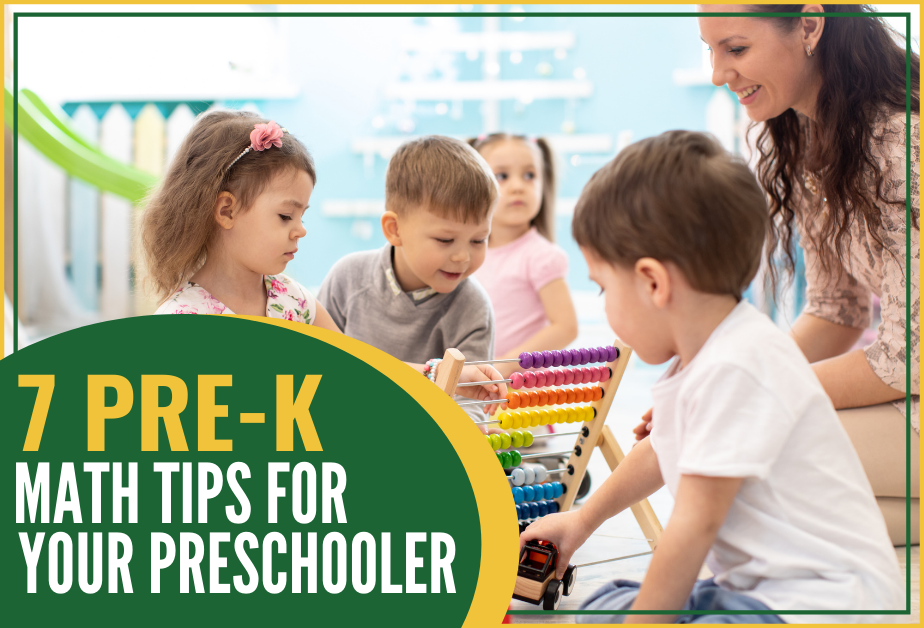7 Pre-K Math Tips For Your Preschooler
As your child prepares for kindergarten, it’s important to lay the foundation for a few basic math concepts. These include counting and other basic numeracy skills. Gaining an understanding of these Pre-K math skills is crucial to help their transition into kindergarten and formal education. While learning math can be challenging for some kids, there are plenty of things you can do to help give your little one a head start. Here are seven Pre-K math tips for you and your preschooler!
Make math fun and interactive
One of the best ways to help kids learn math is to make it fun and engaging. Some kids dread working with numbers, and some even suffer from "math anxiety." However, math can be a fun and enjoyable subject if you use a fun approach.
There are plenty of engaging math-themed activities and games out there that can help kids master basic facts in a fun and stimulating way. For example, you can play a variety of counting games, math puzzles, board games, or online math games. Doing so will help kids see that math isn't so bad after all!
Use visuals and manipulatives
Another way to help kids learn math is by incorporating visuals and manipulatives into math activities. These may involve using flashcards with pictures, math counters, or other objects like blocks.
When you use visuals and manipulatives, seeing and touching math concepts in motion can help kids gain a better understanding of math concepts. Doing this also makes math more concrete and less abstract for kids.
Teach one concept at a time
Children tend to learn math concepts most effectively when they are taught one concept at a time. This helps ensure that they can focus on each specific concept, rather than being overwhelmed with multiple things at once.
You can break down math concepts into smaller parts so that kids can understand them more easily. Start with the basics and then as your child becomes more comfortable, you can move on to more complex concepts. For example, it’s best to start with counting and ensure that your little one has a strong grasp on this concept before moving on to addition.
Encourage practice and repetition
Like any skill, math requires adequate practice and repetition in order for kids to learn. The more they practice, the more adept they will become at math.
Give children opportunities to practice their math skills. Incorporate math concepts into your daily activities. For example, bring children with you to the grocery store and ask them to count how many boxes of cereal are in your cart, or see if they can count the number of steps in the staircase.
Use math in everyday situations
One of the best ways for kids to learn about math is to see the concepts in action in everyday situations. This helps them understand that math is more than just a subject they learn in school, but rather a helpful tool that they can use in the real world.
For example, ask children to help you with cooking. You can have them measure ingredients, divide amounts in half or multiply them by two, or even help you calculate the cost of ingredients for a recipe. If they help you with food shopping, you might ask them to help you figure out how long it will take to get to your destination, how much money you have left after shopping, or whether or not you have enough of a given ingredient.
Make math a family affair
Math isn't just for kids! Parents can practice math too! One way to help kids learn math is by making it a family affair. By doing this, children can see that math is an essential skill that is used by everyone in the family, and one from which we can all benefit.
Carve out some time to work together as a family to solve math problems, discuss math concepts during dinner, or play fun math games together. These activities can help kids see the value of math while providing fun activities that the whole family can enjoy.
Help children develop a growth mindset
A “growth mindset” refers to being able to view math as a subject that can be learned and mastered with effort and practice, and is essential when it comes to learning math. It’s beneficial for children to have this type of outlook when they learn new math concepts, as it will encourage them to persevere through challenges and resist giving up easily.
When kids encounter setbacks, remind them that everyone makes mistakes, and that they will be able to improve with hard work. Help them see learning math as an achievable goal, even if it does present challenges from time to time.
These are just a few tips to help get your preschooler started with learning some basic math concepts. With a little effort from you and lots of practice, children can be on their way to math success!
Mrs. Myers's Learning Lab takes pride in our numeracy program, which focuses on mathematical concepts while providing student interaction through problem-solving tasks. Students in our math program get the chance to use modern technology by writing and illustrating their own problem-solving book in our patent-pending Build-a-Book app, which we print out and give to our students to keep. Learn more by visiting our website!





